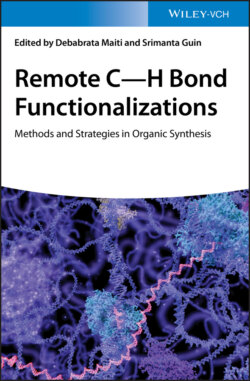Читать книгу Remote C-H Bond Functionalizations - Группа авторов - Страница 26
2.4 Conclusion
ОглавлениеSince 2012, the directing template approach has promoted a range of meta‐selective C–H activation reactions with several classes of substrate. Three major classes of directing templates have been engineered by recognition of the geometry and distance between the directing atom and the target meta‐CH bonds. The number of transformation types also increases gradually since the first discovery of meta‐C–H olefination. Despite the advances, the directing template strategy still suffers from several limitations. First, the transformation type is still limited, such as amination, fluorination, and alkynylation are not feasible at present. Thus, new protocols with possible new templates are needed. Second, it is not step‐economic to link the template with the substrate with a covalent bond. Although breakthroughs in using catalytic amount of templates have been disclosed, these protocols were limited to special substrates and suffer from limitations such as high metal catalyst loadings and high molecular weights. Therefore, the discovery of more efficient systems using template through non‐covalent interaction is highly desirable. Third, the high catalyst loading and the use of precious metal catalysts are not practical for the application of this method for large scale synthesis. The search for more effective catalytic protocols using low‐cost metal catalysts and even in a low loading is well‐worth investigating. In short, there are still many opportunities for exciting discoveries in the field of meta‐C–H functionalization assisted by directing templates.
